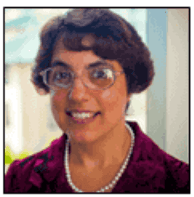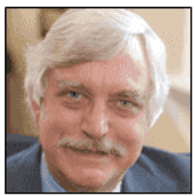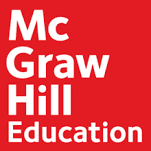Keynote Speakers
"Balancing Learning and Productivity Through Shared Cognition in Team-Based Learning"
Dr. Carolyn Rosé
Professor of Language Technologies and Human-Computer Interaction, Carnegie Mellon University
Monday April 1, 2019 at 9:00AM
With the rapidly changing landscape of work, continuous learning and workforce retraining are both of increasing worldwide concern, as is preparing youth for a career in this changing landscape. Yet research targeting these problems has a proportionately small representation within the learning sciences. Though well meaning companies offer training opportunities to their employees, the reality is that when push comes to shove, short term productivity often takes precedence over learning and higher productivity in the long term. This talk reviews a foundation in research over the past decade focused on providing opportunities for group learning at scale and how this past work provides a foundation for current work towards embedding collaborative learning opportunities in the work itself. In particular, this talk explores a new paradigm for team based work that engages the group in shared cognition in the midst of problem solving so that learning and productivity can be interleaved. This talk reports on evaluations of this new paradigm in university courses where the tension between learning and performance is already keenly felt and sets a vision for ongoing work while reporting on a pilot with industry professionals.
Dr. Carolyn Rosé is a Professor of Language Technologies and Human-Computer Interaction in the School of Computer Science at Carnegie Mellon University. Her research program is focused on better understanding the social and pragmatic nature of conversation, and using this understanding to build computational systems that can improve the efficacy of conversation between people, and between people and computers. In order to pursue these goals, she invokes approaches from computational discourse analysis and text mining, conversational agents, and computer supported collaborative learning. Her research group’s highly interdisciplinary work, published in over 200 peer reviewed publications, is represented in the top venues in 5 fields: namely, Language Technologies, Learning Sciences, Cognitive Science, Educational Technology, and Human-Computer Interaction, with awards in 3 of these fields. She serves as Past President and Inaugural Fellow of the International Society of the Learning Sciences, Senior member of IEEE, Founding Chair of the International Alliance to Advance Learning in the Digital Era, Executive Editor of the International Journal of Computer-Supported Collaborative Learning, and Associate Editor of the IEEE Transactions on Learning Technologies.
"Collaboration via Constructing Shared Mental Models:
The Value of Immersive Experiences and Representations"
Dr. Christopher Dede
Timothy E. Wirth Professor in Learning Technologies, Harvard University
Tuesday April 2, 2019 at 9:00AM
Collaboration is enhanced when participants have mutual experiences about which they co-construct shared representations (e.g., a group of physicians conducting grand rounds). Immersive media (virtual, mixed and augmented realities) can provide richly interactive experiences with complex phenomena, making salient the determinants of causal dynamics (e.g., superimposing force vectors on a manipulable three-dimensional model of an electromagnetic field). This presentation describes findings from several research projects at Harvard in which K-12 students work in teams to understand and model phenomena in physics and ecosystems science. Shared representations such as concept maps and programming environments enhance collaboration and deepen participants’ understanding.
Dr. Christopher Dede's fundamental interest is developing new types of educational systems to meet the opportunities and challenges of the 21st century. His research spans emerging technologies for learning, infusing technology into large-scale educational improvement initiatives, developing policies that support educational transformation, and providing leadership in educational innovation. He is currently conducting funded studies to develop and assess learning environments based on virtual worlds, augmented realities, transformed social interaction, and online teacher professional development. Dede is a leader in mobile learning initiatives and has developed a widely used Framework for scaling up educational innovations. From 2001 to 2004, he served as chair of the Learning & Teaching area at the Harvard Graduate School of Education.
Lunch Speakers
"Analytics, Adaptivity, and Agency in Digitally-Mediated Team Learning"
Dr. Alyssa Wise
Associate Professor of Learning Sciences and Educational Technology and Director of NYU Learning Analytics Research Network
New York University
New York University
Monday April 1, 2019 at 1:00PM
.
Dr. Alyssa Friend Wise is an Associate Professor of Learning Sciences and Educational Technology in the Steinhardt School of Culture, Education, and Human Development and the Director of LEARN, NYU's university-wide Learning Analytics Research Network She holds a Ph.D. in the Learning Sciences and M.S. in Instructional Systems Technology, both from Indiana University, and a B. S. in Chemistry from Yale University. Dr. Wise's research is situated at the intersection of the learning sciences and educational data science, focusing on the design of learning analytics systems that are theoretically grounded, computationally robust, and pedagogically useful for informing teaching and learning. Dr. Wise is an Editor in Chief of the Journal of Learning Analytics and an Associate Editor of the Journal of the Learning Sciences. She served as a member of the Executive Committee of the Society for Learning Analytics Research from 2012-2018 and on the Computer-Supported Collaborative Learning Committee within in the International Society of the Learning Sciences from 2012-2016. Previously Dr. Wise was Associate Professor and Coordinator of the Educational Technology & Learning Design Programs at Simon Fraser University in Canada.
"Shared regulation in CSCL"
Dr. Angela M. O'Donnell
Professor, Graduate School of Education, Rutgers University
Tuesday April 2, 2019 at 1:00PM
Dr. Angela M. O'Donnell is a Professor in the Department of Educational Psychology at the Graduate School of Education at Rutgers. Her research explores the significance of peers in the learning process. She received her Ph.D. in Experimental Psychology (Cognition) from Texas Christian University in 1986. She is a Fellow of the American Educational Research Association and a Fellow of the American Psychological Association. She has been a Carnegie Academy Presidential Fellow for the Scholarship of Teaching and Learning, and she has received the AERA recognition for Outstanding Career Contributions to Cooperative Learning.
Panelists
"The Future of Cooperative Learning in STEM: 1, 3, and 5 Year Research"
Drs. Sarah Carey, Cathleen A. Norris, Matthew Ohland, Elliot Soloway, and Jianwei Zhang
Monday April 1, 2019 at 5:00PM
Panel discussion "talking points" coming soon.
Dr. Sarah Carey is Executive Director of Product Management at McGraw Hill Education. She leads product management for Higher Education and oversees our suite of digital solutions: Connect, ALEKS & SIMnet, including a large team of discipline-area & platform-area product managers who are the direct liaisons from the business to the platform engineering teams – ensuring that the voice of the customer remains front and center. Sarah has over 11 years of experience in Higher Education, including eight years of undergraduate & graduate-level teaching in Italian Studies both in the U.S. and abroad. She received her Ph.D. from UCLA in modern Italian literature and film. Sarah was awarded the prestigious Andrew W. Mellon Post-Doctoral Fellowship in the Humanities in 2010, holding that post at Stanford University and then serving as Associate Chair of the French & Italian Department. She is the author of nearly a dozen scholarly publications; her latest work is a chapter entitled “Film and Photography” in the forthcoming edited volume THE TOTAL ART: Italian Cinema from Silent Screen to Digital Image from Bloomsbury.
Dr. Cathleen A. Norris is a Regents Professor in the Department of Learning Technologies at the University of North Texas, Denton, TX. From 1995-2001, Norris was President of the National Educational Computing Association, and led its merger with ISTE, the International Society for Technology in Education, creating the largest, international organization for technology-minded educators in the world. Norris was Co-President of ISTE from 2001-2004. Norris’ 14 years in K-12 classrooms – receiving a Golden Apple Award from Dallas ISD along the way – has shaped her university R&D agenda: developing resources to support K-12 teachers as they move into 21st century classrooms.
Dr. Matthew Ohland is a Professor in the School of Engineering Education at Purdue University. He is a Fellow of the American Society of Engineering Education and a Fellow of IEEE. Along with his research partners, he was recognized for his work on longitudinal studies of engineering students with best paper awards in the Journal of Engineering Education in 2008 and 2011 and the IEEE Transactions on Education in 2011 and 2015 in addition to best paper awards at multiple conferences. Software for team formation and peer evaluation developed under Dr. Ohland’s leadership has also received various awards and has been used by over 650,000 students worldwide. He received the Charles B. Murphy Award, Purdue University’s highest teaching recognition, in 2015. Dr. Ohland previously served as Associate Professor of General Engineering at Clemson University, Assistant Director of the NSF-sponsored SUCCEED Engineering Education Coalition and an NSF Postdoctoral Fellow for Science, Mathematics, Engineering, and Technology Education. Dr. Ohland has a Ph.D. in Civil Engineering from the University of Florida. Previously, he earned an M.S. in Materials Engineering and an M.S. in Mechanical Engineering in 1991 from Rensselaer Polytechnic Institute and a B.S. in Engineering and a B.A. in Religion from Swarthmore College.
Dr. Elliot Soloway is an Arthur F. Thurnau Professor, in the Department of Computer Science and Engineering at the University of Michigan, Ann Arbor, MI. In 2001, the UMich undergraduates selected him to receive the “Golden Apple Award” as the Outstanding Teacher of the Year at the University of Michigan. In 2004 and in 2011, students in the College of Engineering HKN Honor Society selected Dr. Soloway to receive the “Distinguished Teacher of the Year Award.” Soloway and Norris’ educational vision is that providing K-12 teachers with OER-based, deeply-digital curriculum, that they can then localize, individualize, etc., is the key to the digital transformation of K-12.
Dr. Jianwei Zhang is an Associate Professor in the Department of Educational Theory and Practice at the University at Albany, State University of New York. His research explores social and cognitive dynamics of collaborative learning and knowledge building supported by new technology-based environments. Funded by National Science Foundation (NSF) and other sources, Dr. Zhang is leading an interdisciplinary team to create pedagogical and technological support for sustained knowledge building using a principle-based, emergent structuration approach. Beyond short inquiry activities to construct knowledge following given procedures and structures, students co-generate and adapt collective structures of inquiry (conceptual directions, cycles of inquiry, participatory structures) to guide their progressive inquiry and discourse over multiple months. This process is supported by the Idea Thread Mapper (ITM) (created with Mei-Hwa Chen), a software tool to trace collective progress in extended online discourse, feedback on emergent structures, and connect idea threads across communities for mutual build-on and dynamic collaboration. He currently serves as Associate Editor of the Journal of the Learning Sciences and as a board member for the International Journal of Computer-Supported Collaborative Learning (ijCSCL) and several other journals.
Showcases
Sunday March 31, 2019 at 3:00PM - 6:00PM
CATME Smarter Teamwork
CATME SMARTER Teamwork prepares students to function effectively in teams and supports faculty as they manage their students’ team experiences. It is a system of secure, web-based tools that enable instructors to implement best practices in managing student teams. Launched from an NSF grant in 2003, CATME tools and training have been continuously supported by the literature on teamwork and training, along with independent empirical research. The CATME system enhances team learning by teaching students how to contribute effectively to teamwork and creating accountability for team-member contributions. The system facilitates communication among teammates and between students and their instructor. This helps student teams have the best chance of being successful so that students and instructors have positive and meaningful team learning experiences.
Collabrify
Collabrify Dashboard allows teachers to distribute Roadmaps and to create collaborative groups, monitor the student enactment of Roadmaps, and finally, to assess the artifacts produced by the students during enactment. Collabrify Map is a “collabrified” concept mapping tool. Students can work together, synchronously, in realtime, to co-create concept maps that graphically help students to organize and represent knowledge – and their evolving understanding! Each colored, labeled node can include a text comment and/or an image; the image will be display in the node on the concept map, Other apps in the Collabrify Suite such as Collabrify Flipbook enables students to work together, synchronously, in real-time, to co-create drawings or flipbook style animations. Collabrify Chart enables students to collaboratively create a chart and graph its data. Collabrify KWL enables students and teachers to employ KWL charting collaboratively and allows students to work together, synchronously, in real-_time, to share what they know and want to learn about a concept.
Idea Thread Mapper (ITM)
Idea Thread Mapper (ITM) is a research-based collaborative platform that supports student-directed, collaborative knowledge building both within and across classrooms. Inquiry-based, knowledge building pedagogy needs new classroom innovations and technology designs to enable sustained, connected, and long-term inquiry within each classroom and to further enable idea build-on across classrooms. We designed ITM to address these needs, drawing upon our theoretical and empirical research on collaborative learning and knowledge building. Our innovations focus on two goals: (a) Supporting student-driven, ever-deepening inquiry processes in a way that engages student responsibility for structuring the collective journey of inquiry; (b) Making student creative progress accessible across classrooms for mutual learning and build-on.
InteDashboard
InteDashboard is the world’s #1 dedicated software platform created exclusively for the team-based learning (“TBL”) methodology. Over 75 institutions have used Intedashboard to save administrative time and improve outcomes with real-time data in physical and online TBL classrooms. Over 90% of faculty would recommend InteDashboard’s features which include: individual readiness assurance tests (“IRAT”) and team-readiness assurance tests with immediate feedback (“TRAT”), team application exercises, electronic gallery walks and 360-degree teammate peer evaluation. InteDashboard integrates with existing learning management systems using the Learning Tools Interoperability (“LTI”) standard. InteDashboard was developed in collaboration with Duke-National University of Singapore Medical School. InteDashboard is an official Instructure Partner, AWS EdStart Member and recipient of a Reimagine Education Award for hybrid learning from QS Rankings and Wharton’s Learning Lab.
McGraw Hill Education
McGraw Hill Education has been a leader in education for more than 125 years. That tradition continues today, as we leverage the strength of content with the power of adaptive technology and data to reach students in ways never before possible. McGraw-Hill Education's vision is to unlock the full potential of each learner and our mission is to accelerate learning through intuitive, engaging, efficient and effective experiences grounded in research. We believe that our contribution to a brighter future for each learner lies within the application of our deep understanding of how learning happens and how the mind develops. It exists where the science of learning meets the art of teaching. Engineering Connect® and ALEKS® Prep for Statics provide easy-to-use online learning management solutions that embed learning science and award-winning adaptive tools to improve student results. With digital, print, rental, and mobile options, instructors get the flexibility to teach their course their way, and provide students with affordable course materials designed to help them succeed.














